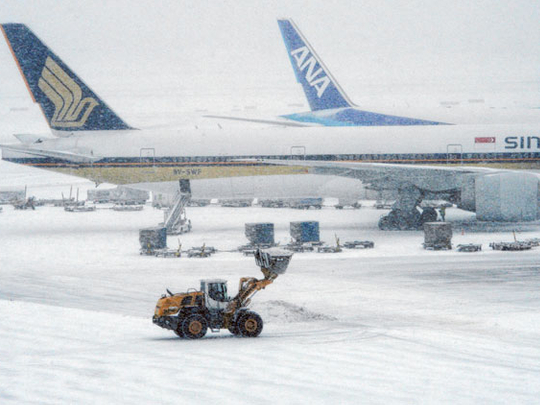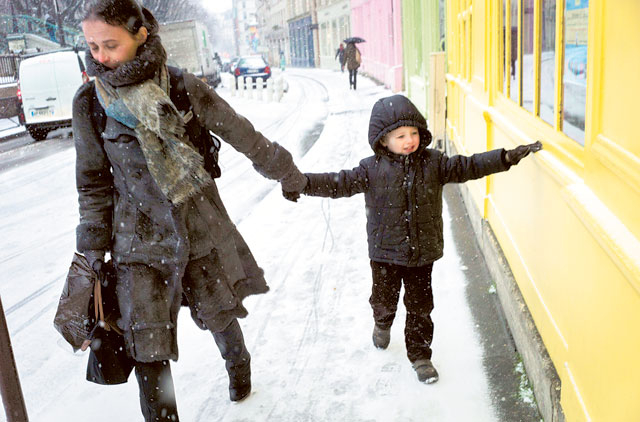
Dubai: Despite heavy snow fall that crippled north-western Europe for the past two days, air travel to and from the continent to Dubai, Abu Dhabi and Doha operated normally yesterday.
Emirates, Etihad and Qatar airways all reported that there were no weather delays caused by the blizzard-like conditions that dumped up to a half-metre of snow in parts of Europe.
All of the Gulf-based carriers reported no delays due to the weather.
If that was the case in the Gulf, travellers passing through Frankfurt, Paris and Munich faced cancellations and long delays.
Frankfurt, Europe’s third-busiest hub, has only two of four runways available, prompting the scrapping of more than 100 of 1,250 scheduled flights, mostly due to a backlog that’s left planes out of position and flight schedules in tatters.
Yesterday, German authorities were trying their best to open all landing strips by nightfall.
“Yesterday was extreme even for a winter day and will keep weighing on the situation for the next couple of days,” said Matthias Nosseck, a spokesman for Fraport AG, the airport’s owner. “Things are improving though, as it’s stopped snowing.”
A Boeing 737 landing at Katowice, Poland, slipped off an icy runway, causing a scare for the 182 crew and passengers on board the flight from Sharm Al Shaikh in Egypt.
Experts are still in the process of recovering the plane while all flights are being redirected to Krakow.
Northern France was hit hard by the rare late-winter storm — spring officially starts in eight days’ time — and a half-metre of snow fell over Brittany, Normandy and Flanders.
Service on Eurostar, the high-speed train that links Paris and Brussels with London through the Channel Tunnel, was mostly restored yesterday after Tuesday’s cancellation. There were still some delays, however. Nearly 10,000 employees of France’s rail company worked to clear the snow off the rail lines and continue their service.
The sun was shining in Paris, where buildings were covered in a picturesque blanket of snow and a lone cross-country skier was seen on the Champ de Mars near the Eiffel Tower. The temperature was at -5 degrees Celsius, well below seasonal averages.
The icy conditions caused road closures and slowdowns but highways were gradually opened as snowdrifts were cleared and vehicles stranded during the snowstorm were recovered.
Prime Minister Jean-Marc Ayrault warned that disruptions could continue for another 48 hours.
“I think that things should be better by Friday, at least on the weather front,” he said. “The situation is under control, the organisation is at the necessary level.”
About 69,000 homes were without power in France yesterday, including about 30,000 that lost electricity after the snowstorm moved south into the Alps.
Temperatures hovered close to freezing in Britain, with snow expected in parts of Scotland and eastern England. Motorways in the south of the country were blocked as lorries were backed up following delays to freight and passenger services through the Channel Tunnel.
Southern England was also felt the severity of the storm with snow and freezing conditions.
French soldiers were mobilised to help workers restore electricity to about 80,000 homes in the country’s north-east, left without power after the snowstorm.
Icy conditions are forecast to last at least until today.
Snow and freezing conditions also struck southern England and the Channel Islands have experienced some of their worst conditions in decades.
Hundreds of French schoolchildren were left stuck on a ferry stranded in the English Channel for more than 24 hours
The Oscar Wilde had been delayed from its arrival at Cherbourg, France, from Ireland by more than a day after rough seas prevented a safe dock despite five attempts.
And just when the estimated 500 passengers thought their ordeal was over, the Irish Ferries ship doors failed to open. They were forced to wait a further four hours for engineers to fix the problem
The journey from Ireland to France was meant to be overnight but ended up taking two days.
Irish Ferries blamed ‘a hydraulic failure’ for preventing them from letting passengers - including 245 French pupils returning from a school trip to Ireland — back onto dry land. But because conditions in the English Channel remained dangerous, harbour authorities warned the ship’s captain against moving the ferry.
A total of 245 French school pupils were among those on board.
Belgium was also seeing a return to normal with train and public transport services improving, though icy roads were causing some disruptions.
— Maryam Mirza is an intern at Gulf News
— with inputs from agencies












